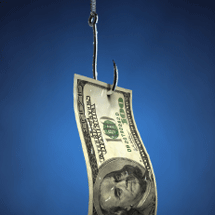 |
the dangers of debt
Avoiding the debt-traps that can ruin your retirement.
by Norma Jackson Goldman
Learn more about the Free Will Baptist Board of Retirement at www.nafwb.org.
|
ACCORDING TO USA TODAY, “soaring healthcare costs are hitting seniors at a time when more employers are cutting back on retiree medical and pension benefits.” (1) Yet with advances in healthcare and lifestyle, people are living longer—75.5 years for men and 90.7 years for women! (2) Contrast those figures with a life expectancy in 1957 of 66.4 for men and 72.7 for women. What does this mean for people contemplating retirement or those who are already there?
While the essentials of a good retirement plan might be in place, unusual increases in any category of expense could cause a comfortable budget to become extremely tight. Seniors report the major budget-busters are overuse of credit, rising health care and prescription drug costs, and higher real estate taxes. These are but a few of the reasons seasoned financial professionals urge seniors to continue saving into retirement, to live beneath their incomes, to avoid credit, and to resist taking on new debt.

In addition to higher living expenses, many seniors make unwise choices, especially when they acquire new debt with no way to repay it. Consider an average couple in Charlotte, North Carolina. Wife Carolyn is 65 and husband Charles is 68. After Carolyn developed serious health issues, the couple depleted their savings and now use credit cards to pay medical bills. Earlier, they took out loans to help a grandchild with college expenses, using all their discretionary funds to do so. This choice, however well intentioned, has put them at risk. Carolyn can no longer work, and Charles feels he must stay at home to help his wife. Unfortunately, the unwise earlier choice means that Charles must work at least part-time to keep their heads above water, with no hope of repaying the education loan.
Others, through no fault of their own, encounter serious, life-threatening ailments that consume huge amounts of income and/or savings. Catastrophic illnesses easily deplete otherwise healthy savings and devour home equity—not to mention the retirees’ peace of mind.
The result of these demands for dollars is that great numbers of seniors are tempted to take out a second mortgage, jeopardizing the security of what is likely their greatest single investment. Hardly a day passes that homeowners do not get one or two solicitations, urging them to use a second mortgage to pay off credit card debts, medical bills, or the costs of remodeling.
However, the pressure of a second mortgage coupled with other unexpected expenses often proves too daunting, causing many retirees to file bankruptcy. Seniors are now the fastest growing segment of the population to file personal bankruptcy. Seniors who opted for early retirement continue to move reluctantly back into the workforce, albeit at lower salaries. While the effects of the huge surge in baby boomer retirees has not been fully felt, over the next decade or so the full impact could erode the two systems that currently shore up retirement income—Social Security and Medicare. Some economists believe that when this happens, a decrease in benefits is inevitable.
In 1992, 53.8% of seniors 55 years old were in debt, averaging $29,309 while only 31.9% of seniors 75 and older were in debt, averaging $7,769. By 2004, those numbers had soared, with 60.6% of seniors 55 owing an average of $51,791 and 40.3% of seniors 75 and older owing $20,234 on average.
As black as this picture appears, there is hope. The ‘preventive medicine’ of regular saving, avoiding credit, and resisting the temptation to take on the debts of others is great prescription for a healthy financial lifestyle. With healthier lifestyles, more senior citizens in the workplace past 65, and many more delaying retirement altogether, there are plenty of opportunities for seniors to avoid the dangers of debt!
(1)
USA TODAY, page 1, January 23, 2007
(2) AARP Bulletin, page 39, June 2007
|

